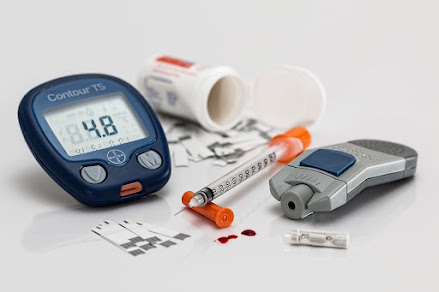The guava fruit is a source of vitamin C, fibre, and other substances that acts like antioxidants. Antioxidants slow down or stop the harmful effects of oxidation. Oxidation is a chemical reaction in which oxygen is added to a chemical element or compound. Guava leaves also contain chemicals with antioxidant and other effects. It is not known how guava works for medical conditions.
Guava fruit benefits in Diarrhea, Diabetes, Cough, Cataracts, High cholesterol, Heart disease and Cancer.
There is a good thing about guava which makes guava special, is that protecting the fruit does not require excessive use of chemical pesticides as in the case of grapes, apple, and other so-called “exotic” fruits. It is one of the least chemically treated and sprayed fruits.
Here are the nutritional elements data present in Guava:-
Nutritional value in Guava per 100 g
- Energy - 285 kJ (68 kcal)
- Sugars - 8.92 g
- Dietary fiber - 5.4 g
- Vitamin B6 - 0.11 mg
- Vitamin C - 28.3 mg
- Calcium - 18 mg
- Iron - 0.26 mg
- Magnesium - 22 mg
- Manganese - 0.15 mg
- Phosphorus - 40 mg
- Potassium - 417 mg
- Sodium - 2 mg
- Zinc - 0.23 mg
Health Benefits of Guava
Guava has so many health benefits. Some of them are given below:-
Help in Weight loss:
Guava is very helpful for those who want to lose weight without compromising their intake of proteins, vitamins and fiber. Guava is very rich in vitamins, proteins and minerals, but it has no cholesterol and a low number of digestible carbohydrates. It is a very good snack and satisfies the appetite very easily. Guava, especially raw guava, also has far less sugar as compared to apples, oranges, grapes, and other fruit. Adding a medium sized guava to your lunch and you will not feel hungry again until the evening. It can also help with weight gain in lean, thin people. This is probably due to its wealth of nutrients, which keep the metabolism regulates and helps to promote the proper absorption of nutrients.
Help in Diabetes:
One of the benefit of guava is to control blood pressure but an intake of guava can also help those patients who suffer from diabetes. The high level of dietary fiber in guava helps to regulate the absorption of sugar by the body, which decreases the chances of major spikes and drops in insulin and glucose in the body. Studies have shown that consuming guava can help prevent the appearance of type-2 diabetes.
Makes Eyesight Bright:
As you know, guavas are extremely good sources of vitamin-A, which is well known as a booster for vision health. It can help slow down the appearance of cataracts, macular degeneration, and general health of the eyes. It can not only prevent degradation of eyesight, but even an improvement in eyesight once it has begun to degrade.
Help in Cancer Prevention:
One of the most important benefits of adding guava to your diet is its ability to inhibit the growth and metastasis of cancerous cells. There have been numerous studies done in recent years on guava’s effects primarily on prostate cancer, breast cancer, and oral cancers. Guava leaf oil is extremely successful as an anti-proliferative substance and has actually been shown to be more effective than some leading modern medicines in reducing cancerous growth. Guavas are also rich in lycopene, a powerful antioxidant that has been shown to be wildly successful in reducing prostate cancer risk. That same antioxidant has also shown to inhibit the growth of breast cancer cells, although further human trials need to be done.
Guava contains high levels of vitamin C in guavas, which are four times higher than the levels found in oranges, provides the immune system a huge boost in antioxidants. Antioxidants are the major lines of defense against the free radicals in the body, which are one of the main causes of serious conditions like cancer and heart disease. Therefore, adding guava to your diet has numerous ways in which it helps you stay healthy and cancer-free.
Scurvy:
Guava can outdo many other fruits, including orange and other citrus fruits, in terms of its concentration of vitamin C. A deficiency of vitamin C can cause scurvy (a disease caused by a deficiency of vitamin C) and proper intake of vitamin C is the only known remedy for that disease. In fact, guavas contain 5 times more vitamin C than oranges, which are often heralded as the absolute best source of that beneficial vitamin.
Tooth, Diarrhea & Dysentery:
Guava is very rich in astringents (compounds that make your gums feel tighter and fresher). After you chew guava leaves, eat a raw guava, or use some guava-based toothpaste), your mouth feels healthier, and the astringent qualities also add substance to loose bowels and reduce symptoms of diarrhea. These astringents are alkaline in nature and have disinfectant and anti-bacterial properties, thus helping to cure dysentery by inhibiting microbial growth and removing extra mucus from the intestines. Furthermore, other nutrients in guava such as vitamin C, Carotenoids and potassium, strengthen and tone the digestive system while simultaneously disinfecting it. Guava is also beneficial in treating gastroenteritis for the same reasons stated above.
Help in Thyroid Health:
Guavas are a good source for copper, which is an important part of regulating thyroid metabolism by helping to control hormone production and absorption. The thyroid gland is one of the most important glands in the body for regulating hormones and organ system function, so guava can help balance your health in many ways.
Constipation:
Guava is one of the richest sources of dietary fiber. Its seeds, if ingested whole or chewed, serve as excellent laxatives. These two properties of guava help the formation of healthy bowel movements, and aid the body in retaining water and thoroughly cleaning your intestines and excretory system. It is said that constipation alone can lead to 72 different types of ailments, so any help with constipation is beneficial. Your total health is undeniably affected by proper digestion, and more importantly, proper excretion. Frequent consumption of guava can ensure both.
Help in Brain Health:
Another of the tremendous positive benefits of guavas is the presence of B3 and B6 vitamins. B3 (also known as niacin) can increase blood flow and stimulates cognitive function. B6 is a great nutrient for brain and nerve function. Therefore, eating guava can help you increase brain function and sharpen you focus.
Help in Cough & cold:
Juice of raw and immature guavas or a decoction of guava-leaves is very helpful in relieving coughs and colds by reducing mucus, disinfecting the respiratory tract, throat and lungs, and inhibiting microbial activity with its astringent properties. Guava has one of the highest quantities of vitamin-C and iron among fruits, and both are proven to be preventive against colds and viral infections. In some areas of India, roasted ripe guava is used as a remedy against extreme cases of cough, cold, and congestion. Ripe guava should be avoided by people who are suffering from cough and cold, as it can exacerbate the problem, and one should also avoid drinking water immedaitely after eating guava as it can lead to a sore throat.
Help in Skin care:
Guavas can improve the texture of your skin and help you to avoid skin problems more than even the highest ranked beauty creams or skin toner gels. This is chiefly due to the abundance of astringents in the fruit (more astringent is present in immature guavas) and in its leaves. Your skin can benefit from either eating the fruits (this helps tighten your muscles apart from your skin) or by rinsing your skin with a decoction of its immature fruit and leaves. It will tone up and tighten the area of loosened skin where you apply it. In addition to the astringents, guava is very rich in vitamin-A, B, C and potassium which are good antioxidants and detoxifiers, which keep your skin glowing and free from signs of premature aging, wrinkles and other dermal disorders.
Reduce High blood pressure:
Guava helps reduce cholesterol in the blood and prevents it from thickening, thereby maintaining the fluidity of blood and reducing blood pressure. Studies have shown that food lacking fiber (such as refined flour) add to blood pressure, due to its quick conversion to sugar. Guava, being very rich in fiber and hypoglycemic in nature, helps reduce blood pressure.
Other benefits of guava:
There are so many health benefits of guava, it is hard to know where to begin. It is important to know that guava helps control diabetes and protects the prostate. The juice of guava leaves has been known to cure toothaches, swollen gums & oral ulcers, and the juice speeds up the healing process of wounds when applied externally. Finally, it reduces the frequency of convulsions, epilepsy, and bacterial infections.
As with many alternative foods and supplements, there is little risk in eating them in natural form, but you must do your due diligence when taking it in medical forms. Be cautious when adding any new medicinal form of guava into your diet, and it is better to stick to eating guava in its natural form as a raw fruit.















